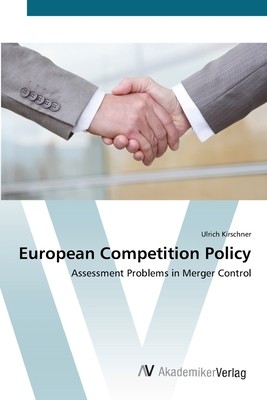
- We will send in 10–14 business days.
- Author: Ulrich Kirschner
- Publisher: AV Akademikerverlag
- Year: 2012
- Pages: 76
- ISBN-10: 3639395778
- ISBN-13: 9783639395778
- Format: 15.2 x 22.9 x 0.5 cm, minkšti viršeliai
- Language: English
- SAVE -10% with code: EXTRA
Reviews
Description
Revision with unchanged content. One of the main and most controversial issues in competition policy is that of merger control. Work by academic researchers and practitioners during the last decades has resulted in laying a theoretical foundation for merger control and some practical applications for it have been developed, but many questions surrounding the concept remain to be answered. For example, what kinds of mergers are so harmful that they need to be prohibited by the state? Ulrich Kirschner starts with a brief overview of the different effects a merger can have and then continues with a detailed exploration of practical assessment approaches. The work focuses on applied empirical methods, commonly used measures based on market structure, and on barriers to entry, setting out the advantages and disadvantages of each type of approach used for merger assessment. The concluding chapter deals with the specifics, and possible consequences, of the current European Competition Policy. The book, which is designed for the academic researcher and interested students, is a welcome contribution to the lively and important debate surrounding the vital topic of merger control in this age of globalization.
EXTRA 10 % discount with code: EXTRA
The promotion ends in 22d.03:24:53
The discount code is valid when purchasing from 10 €. Discounts do not stack.
- Author: Ulrich Kirschner
- Publisher: AV Akademikerverlag
- Year: 2012
- Pages: 76
- ISBN-10: 3639395778
- ISBN-13: 9783639395778
- Format: 15.2 x 22.9 x 0.5 cm, minkšti viršeliai
- Language: English English
Revision with unchanged content. One of the main and most controversial issues in competition policy is that of merger control. Work by academic researchers and practitioners during the last decades has resulted in laying a theoretical foundation for merger control and some practical applications for it have been developed, but many questions surrounding the concept remain to be answered. For example, what kinds of mergers are so harmful that they need to be prohibited by the state? Ulrich Kirschner starts with a brief overview of the different effects a merger can have and then continues with a detailed exploration of practical assessment approaches. The work focuses on applied empirical methods, commonly used measures based on market structure, and on barriers to entry, setting out the advantages and disadvantages of each type of approach used for merger assessment. The concluding chapter deals with the specifics, and possible consequences, of the current European Competition Policy. The book, which is designed for the academic researcher and interested students, is a welcome contribution to the lively and important debate surrounding the vital topic of merger control in this age of globalization.


Reviews